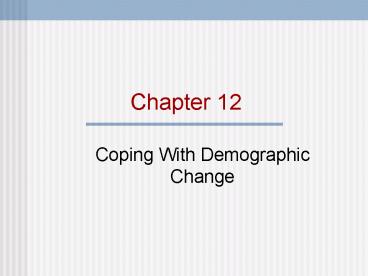Coping With Demographic Change - PowerPoint PPT Presentation
1 / 21
Title:
Coping With Demographic Change
Description:
Policies Designed To Influence The Transitions. World Population ... makers, immigrants are often able to circumvent policies aimed at stopping them. ... – PowerPoint PPT presentation
Number of Views:97
Avg rating:3.0/5.0
Title: Coping With Demographic Change
1
Chapter 12
- Coping With Demographic Change
2
Chapter Outline
- Policies Designed To Influence The Transitions
- World Population Conferences As Policy Tools
- Population Policy In The Twenty-first Century
Managing The Transitions
3
Chapter Outline
- What Is The Population Policy Of The United
States? - What Lies Ahead?
4
Coping
- Three-stage process
- Understanding the fact that unfolding events
represent a potential (or real) problem. - Establishing the motivation to do something about
the problem. - Generating the means to do something about it.
5
Formulating a Population Policy
6
World Population Conferences
- 1974 - produced a World Population Plan of
Action. - 1984 - The U.S. imposed a global gag rule with
respect to use of funds for anything having to do
with abortion. - 1994 produced a Programme of Action emphasizing
the importance of womens social and reproductive
rights.
7
Programme of Action
- Proposed that the mortality transition be managed
by - lowering infant, child, and maternal mortality
- bringing the AIDS pandemic under control
- Without AIDS, it is projected that the world
would have half a billion more people by
mid-century.
8
Lifeboat Ethic
- Based the premise that a lifeboat holds only so
many people and any more than that will cause the
whole boat to sink. - Withholding food and medical supplies could raise
death rates in less-developed nations and provide
a longer voyage for wealthier nations already
riding in the lifeboat.
9
Triage
- Sending aid to countries that show promise of
being able to bring their rates of population
growth under control. - Refers to an army practice of sorting the wounded
into three groups - Those who can survive without immediate
treatment. - Those who will survive if they are treated
without delay. - Those who will die regardless.
10
The World With and Without AIDS
- Between 2000 and 2050 AIDS will be responsible
for the deaths of 278 million more people than
would have otherwise died. - Were it not for AIDS, the projected population in
the year 2050 would actually be half a billion
more people.
11
Factors That Influence the Decline of Fertility
- Educating women.
- Providing women with access to the paid labor
force. - Legalizing the equality in status of males and
females.
12
Factors That Influence the Decline of Fertility
- Legalizing abortion and/or making contraceptives
freely available. - Raising the standard of living, while making
housing and major consumer items difficult to
obtain.
13
Secrets of Successful Family Programs
- Easy accessibility of services
- Community-based approach increases continuation
rates. - High-quality services increase the prevalence
rate. - A greater variety of methods increases the
prevalence rate.
14
Secrets of Successful Family Programs
- Mass-media messages increase the prevalence rate.
- Informal discussions by users with nonusers
increases the prevalence rate.
15
Perverse Laws Of International Migration
- Immigration is a lot easier to start than it is
to stop. - Actions taken to restrict immigration often have
the opposite effect. - The fundamental causes of immigration may be
outside the control of policy makers.
16
Perverse Laws Of International Migration
- Immigrants understand immigration better than
politicians and academicians. - Because they understand immigration better than
policy makers, immigrants are often able to
circumvent policies aimed at stopping them.
17
Age Structure of Different World Regions in 2025,
According to United Nations MediumVariant
Population Projections
18
Age Structure of Different World Regions in 2025,
According to United Nations MediumVariant
Population Projections
19
Age Structure of Different World Regions in 2025,
According to United Nations MediumVariant
Population Projections
20
Age Structure of Different World Regions in 2025,
According to United Nations MediumVariant
Population Projections
21
Changing Sizes of Generational Cohorts in Chile
in Comparison to Political Events, 19502000































